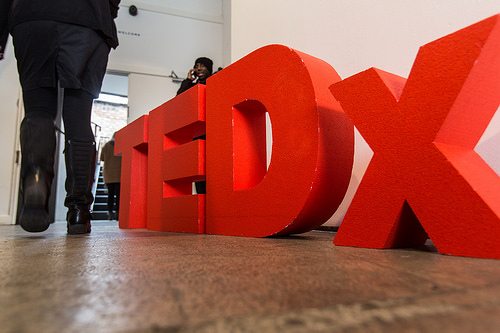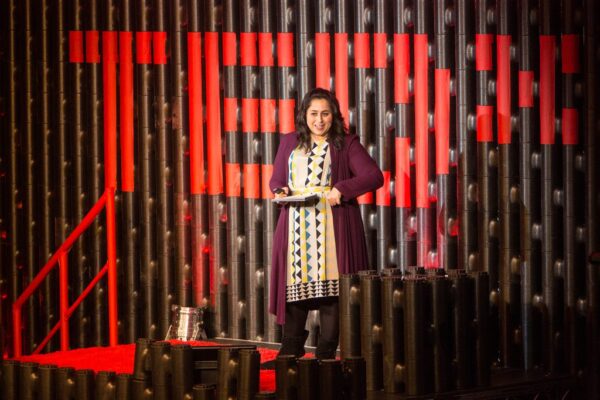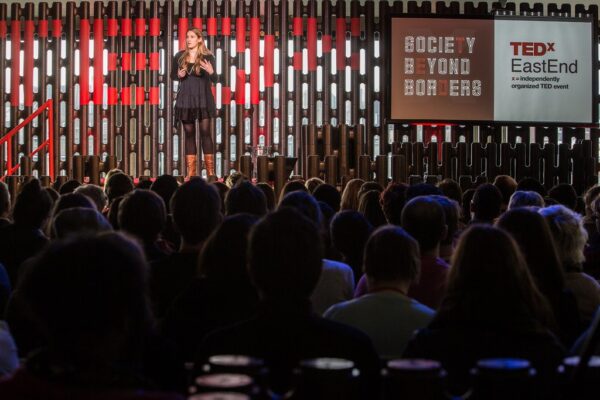

Economy
TEDxEastEnd organiser: TED is not the ‘end point of your exploration’
A platform for world-changing ideas or a “recipe for civilisational disaster”? TED, the popular conference series that shares “ideas worth spreading”, divides opinion – but the woman behind a recent independently-organised TEDx event firmly believes it is a force for good.
Maryam Pasha from the Migrants’ Rights Network (MRN) recently led the TEDxEastEnd event at Oval Space in London’s Bethnal Green.
Under the theme ‘Society Beyond Borders’, 450 people listened to compelling talks on sexism, free trade, activism, anonymity, environmentalism and more. Each section was filmed by Be Inspired Films, and can be watched back on the TEDxEastEnd website.
Pasha spoke with Blue & Green Tomorrow about the event – and about why she believes TED is a valuable tool in furthering knowledge and providing inspiration to many.
Where did the idea for TEDxEastEnd come from initially?
In 2011, I got to go to a live stream in London of the first TED conference on women. They were streaming it in from Washington DC. The organisers said people could apply for their own licenses to hold events like this, with live speakers, videos and so on. I thought it was really interesting.
I did some research on it and realised that you can get a license from TED to run these independently-organised TEDx events. I thought there were lots of topics that I think haven’t been explored or I haven’t seen explored in a TED format that I would really like to. And that’s how it started.
The theme for TEDxEastEnd was ‘Society Beyond Borders’. How did you decide on that?
I do a lot of work in human rights, specifically around immigration. So it’s very much in my consciousness every day. In more and more of my work, I started to see how interconnected everything was. I was starting to see examples of how we are living, increasingly, in a society beyond borders.

Maryam Pasha of the Migrants' Rights Network, who co-ordinated TEDxEastEnd. Photo: Jason Wen
There are also these real contradictions where at the same time there is this great freedom of movement of money, ideas, creativity and collaboration, yet there are some really archaic concepts of physical borders or borders in different fields like in academia or visas. There is real tension.
The list of speakers at TEDxEastEnd was really interesting – did you have any favourites?
I’m not going to tell you! But I can say there were some speakers that really resonated. That’s the thing that’s amazing about TED. For me, the whole point is you should either love or hate what the speaker was saying. That’s where I’ve done my job, because then you’ve started discussion and created a point of conversation.
There were some speakers who I think really touched on a point that really captured people’s imagination. Laura Bates was one of them, because people were either unaware of the magnitude of the problem or the problem at all. I think Leandro Herrero, in praise of borders, was another favourite. He was talking about how we need to keep our borders. I like the fact he was challenging the joyous utopia of a borderless society. Martin Wright was another speaker that people have been telling me they really enjoyed. He talked about new environmentalism, and I think he brought a new perspective to people which was really great. And I think a lot of people enjoyed hearing Brooke Magnant speak about anonymity.
TED has had its critics, with some people saying its ideas are unrealistic. One commentator recently described its model as “a recipe for civilisational disaster”. What are your thoughts?
I think that any platform that encourages criticism of itself is really good. That article [by Benjamin Bratton in the Guardian] was actually a transcript of a talk given at a TEDx event. For me, I find that very encouraging because I think the whole point is dialogue.

A talk by Laura Bates, founder of the Everyday Sexism project, really resonated with the audience at TEDxEastEnd. Photo: Jason Wen
There are two sides to this. In some ways, you’re crowdsourcing TEDx events – that’s what it is. TED has given out its brand and is letting us run with it. You’re going to get varying quality across that, but as well some really great ideas that maybe wouldn’t come to the surface otherwise. It’s brave of TED to take a brand with a really positive reputation and allow us to play with it but I think it’s been really successful.
On the other hand, the thing that I always caution people about is to think that if you come to a TED or a TEDx event, you’re all of a sudden an expert on these topics. They’re just points of conversation. They’re just small ideas worth sharing and the beginning of further exploration. To think that by watching a video on giant squids you’re all of a sudden a marine biologist… I don’t think anyone ever does that, but the criticism of TED is that people fear that will happen. It’s about being a little bit more realistic and acknowledging that most people who are watching these videos are not going to all of a sudden see this as the end point of their exploration.
What do you get out of TED?
Sometimes you lose inspiration, especially when things in a particular field are really bad and negative, and you’re constantly coming up against the worst that we have to offer. Being able to watch these videos that let you see the world or your work differently or give you inspiration and a new perspective is really valuable. It’s not that the content of the video changes your life; it gives you the space to think about things differently. That has been really important.
Are there plans for a TEDxEastEnd in 2015?
Yes, definitely. I already have most of my team harassing me to start planning already which is fantastic. We’re really excited. I think there are a lot of questions we have to answer still, like whether we’ll keep the theme or try something else. There is so much still to say. We want to source more local East End ideas and bring them into TEDxEastEnd. We want to engage more with the local universities. A lot have their own TEDx events but many in east London don’t, so we’d really like to engage with them. I want people to take ownership of it.
What’s the grand vision?
We want to build a stronger TEDx community – that’s something I think you’ll really improve TEDx events in London. We’ve started to and it’s been really wonderful. I know the woman who ran TEDxNewham really well, also TEDxBrixton and some of the smaller events. One of my goals is to really build that network, because in other countries the TEDx community is really strong, and I think we’d like to do that more in London.
Maryam Pasha works for the Migrants’ Rights Network (MRN) and co-ordinated TEDxEastEnd. To view all the talks from the independently-organised event, see here.
Further reading:
TEDxEastEnd: Society Beyond Borders
The Truth about Immigration was more of a narrow discussion
UKIP’s Nigel Farage: ‘there are more important things than money’
Mass migration and social unrest: why the west should care about climate change


 Environment12 months ago
Environment12 months agoAre Polymer Banknotes: an Eco-Friendly Trend or a Groundswell?

 Features11 months ago
Features11 months agoEco-Friendly Cryptocurrencies: Sustainable Investment Choices

 Features12 months ago
Features12 months agoEco-Friendly Crypto Traders Must Find the Right Exchange

 Energy11 months ago
Energy11 months agoThe Growing Role of Solar Panels in Ireland’s Energy Future



























